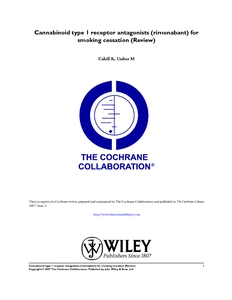Cahill, K; Ussher, M
(2007)
Cannabinoid type I receptor antagonists (rimonabant) for smoking cessation.
COCHRANE DATABASE OF SYSTEMATIC REVIEWS (3).
1 -20.
ISSN 1469-493X
https://doi.org/10.1002/14651858.CD005353.pub2
SGUL Authors: Ussher, Michael Henry
![[img]](https://openaccess.sgul.ac.uk/2667/1.hassmallThumbnailVersion/Ussher%20%26%20Cahill%202007-1.pdf)  Preview |
|
["document_typename_cannot open `/data/SGUL/sgul/eprints3/archives/sgul/documents/disk0/00/00/26/67/01/Ussher' (No such file or directory)" not defined]
Published Version
Download (253kB)
| Preview
|
Abstract
Rimonabant is a selective type 1 cannabinoid ( CB1) receptor antagonist. It may assist with smoking cessation by restoring the balance of the endocannabinoid system, which can be disrupted by prolonged use of nicotine. Rimonabant also seeks to address many smokers' reluctance to persist with a quit attempt because of concerns about weight gain.ObjectivesTo determine whether selective CB1 receptor antagonists increase the numbers of people stopping smokingTo assess their effects on weight change in successful quitters and in those who try to quit but fail.Search strategyWe searched the Cochrane Tobacco Addiction Review Group specialized register for trials, using the terms 'rimonabant' and 'smoking' in the title or abstract, or as keywords. We also searched MEDLINE, EMBASE, CINAHL and PsycINFO, using major MESH terms. We acquired electronic or paper copies of posters of preliminary trial results presented at the American Thoracic Society Meeting in 2005, and at the Society for Research on Nicotine and Tobacco European Meeting 2006. We also attempted to contact the authors of ongoing studies of rimonabant, and Sanofi Aventis ( manufacturers of rimonabant).Selection criteriaTypes of studiesRandomized controlled trialsTypes of participantsAdult smokersTypes of interventionsSelective CB1 receptor antagonists, such as rimonabant.Types of outcome measuresThe primary outcome is smoking status at a minimum of six months after the start of treatment. We preferred sustained cessation rates to point prevalence, and biochemically verified cessation to self-reported quitting. We regarded smokers who drop out or are lost to follow up as continuing smokers. We have noted any adverse effects of treatment.A secondary outcome is weight change associated with the cessation attempt.Data collection and analysisTwo authors checked the abstracts for relevance, and attempted to acquire full trial reports. One author extracted the data, and a second author checked them.Main resultsWe found three trials which met our inclusion criteria, covering 1567 smokers ( cessation: STRATUS-EU and STRATUS-US), and 1661 quitters ( relapse prevention: STRATUS-WW). At one year, the pooled odds ratio ( OR) for quitting with rimonabant 20 mg was 1.61 ( 95% confidence interval ( CI) 1.12 to 2.30). No significant benefit was demonstrated for rimonabant at 5 mg dosage. Adverse events included nausea and upper respiratory tract infections.In the relapse prevention trial, smokers who had quit on the 20 mg regimen were 1 times more likely to remain abstinent on either active regimen than on placebo; the OR for the 20 mg maintenance group was 1.49 ( 95% CI 1.09 to 2.04, and for the 5 mg maintenance group 1.51 ( 95% CI 1.11 to 2.07). There appeared to be no significant benefit of maintenance treatment for the 5 mg quitters. Weight gain was reported to be significantly lower among the 20 mg quitters than in the 5 mg or placebo quitters. During treatment, overweight or obese smokers tended to lose weight, while normal weight smokers did not.Authors' conclusionsFrom the preliminary trial reports available, rimonabant 20 mg may increase the odds of quitting approximately 1 1/2-fold.Adverse events include nausea and upper respiratory tract infections; the risk of serious adverse events is reported to be low.The evidence for rimonabant in maintaining abstinence is inconclusive.Rimonabant 20 mg may moderate weight gain in the long term.
| Item Type: |
Article
|
| Additional Information: |
This review is published as a Cochrane Review in the Cochrane Database of Systematic Reviews 2007, Issue 3. Cochrane Reviews are regularly updated as new evidence emerges and in response to comments and criticisms, and the Cochrane Database of Systematic Reviews should be consulted for the most recent version of the Review. Cahill K and Ussher M. Cannabinoid type 1 receptor antagonists (rimonabant) for smoking cessation. Cochrane Database of Systematic Reviews 2007, Issue 3. Art. No.: CD005353. DOI: 10.1002/14651858.CD005353.pub2. |
| Keywords: |
Adult, Body Weight, Depression, Humans, Nausea, Piperidines, Pyrazoles, Randomized Controlled Trials as Topic, Receptor, Cannabinoid, CB1, Recurrence, Smoking, Smoking Cessation, Suicide, Science & Technology, Life Sciences & Biomedicine, Medicine, General & Internal, General & Internal Medicine, CLINICAL-TRIALS, WEIGHT-GAIN |
| SGUL Research Institute / Research Centre: |
Academic Structure > Population Health Research Institute (INPH) |
| Journal or Publication Title: |
COCHRANE DATABASE OF SYSTEMATIC REVIEWS |
| ISSN: |
1469-493X |
| Related URLs: |
|
| Web of Science ID: |
WOS:000248118000050 |
| Dates: |
| Date |
Event |
| 2007-01-01 |
Published |
|
| URI: |
https://openaccess.sgul.ac.uk/id/eprint/2667 |
| Publisher's version: |
https://doi.org/10.1002/14651858.CD005353.pub2 |
Statistics
Item downloaded times since 06 Jun 2012.
Actions (login required)
 |
Edit Item |


